May 2021 1st edition
May 2021 1st edition Joy
Translations
A hot cup of community development
A hot cup of community development JoyThe Western Cape Honeybush Tea Cooperative (WCHTC) is putting South Africa on the global map as a top tea producer.
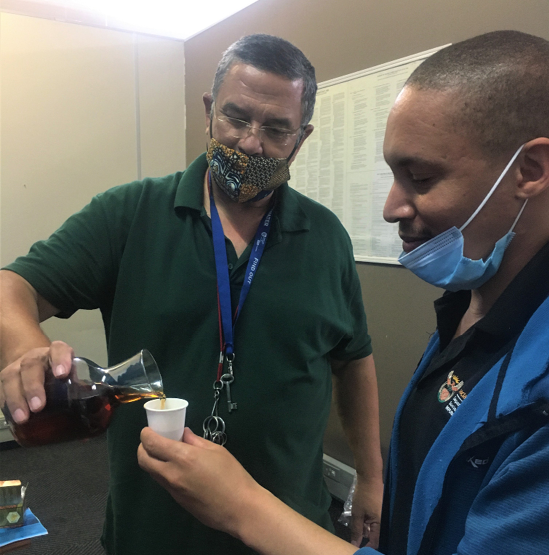 The five-member cooperative is exporting its tea to Switzerland and the world-renowned tea producing country China.
The five-member cooperative is exporting its tea to Switzerland and the world-renowned tea producing country China.
Honeybush tea is a uniquely South African herbal tea. It is made from honeybush, which can be found in the fynbos region, a bushland mountainous area mostly along the Western Cape and Eastern Cape coastal lines.
Chairperson of the cooperative Howard Barends says honeybush is planted in the mountains around Oudtshoorn.
“To ensure that our tea is of the highest standard, we harvest it in the early hours of the morning, when it still has moisture,” he says.
The tea is currently processed at the WCHTC’s factory, where it goes through a boiling process before being sweated for three days. It is then dried for another three days.
“When we dry the tea, we turn it over every three hours to get the right colour and taste for the whole tea. This whole process takes about a week to complete and must be done right all the time,” says Barends.
The cooperative was registered in 2016 by Barends, his brother James, Ferdinad Hector, Raoul du Toit, Channon Hector and Frederick Schroeder. Barends says they chose to register the business as a cooperative to develop the community.
While the company had been in existence for 20 years before this, it was not impacting the community, says Barends.
“When we registered the cooperative, we wanted to use the business to help develop the community of Oudtshoorn. It was easier to do this as a cooperative, than when we were a private company. We also roped in people with the right skills for our cause.”
The WCHTC has started a trust that pays for the higher education of its 52 employees’ children.
The WCHTC received R200 000 in funding from the National Development Agency (NDA). The funding will be used to purchase a tea bag packaging machine.
To apply for assistance from the NDA, call 011 018 5500 or visit www.nda.org.za.
Climate change e-booklets to support farmers
Climate change e-booklets to support farmers JoyThe Western Cape Department of Agriculture has produced e-booklets on climate change, called The Mercury Rises, to assist farmers and the agricultural sector.
Launched by Western Cape MEC of Agriculture, Dr Ivan Meyer, the e-booklets are based on the RSG radio series The Mercury Rises (Die Kwik Styg), which was broadcast from 2018 to 2020.
The radio initiative resulted from the department’s SmartAgri plan and aimed to raise awareness of climate change among listeners.
Launched in 2016, the SmartAgri plan presents a road map for the agricultural sector to travel towards a more productive and sustainable future, despite climate change uncertainties.
The series, produced and funded by the department, spoke to people across the sector and provided expert advice on measures to make South Africa’s agricultural sector more climate resilient.
Due to its popularity and important content, the radio series is being aired again, with programmes in English, Afrikaans and IsiXhosa and e-booklets in these languages.
Special technology will enable the reader to listen to the original radio programme while reading the e-booklet.
“The publication of the e-booklets provides another platform to advance a climate-resilient future for the sector,” says MEC Meyer.
He added that the booklets will support farmers with science-based information on climate change and offer practical solutions at farm and household levels.
Dr Ilse Trautmann, the department’s Chief Director of Research and Technology Development Services said it is important to ensure that the agricultural sector becomes a low-carbon, climate change-resilient sector, by advocating climate-smart production practices.
Chief Executive Officer of Agri Western Cape Jannie Strydom said the ongoing drought in many areas of the province, highlighted the impact of climate change.
“The e-booklet is a user-friendly and effective guide to understanding why and how climate change needs to be managed,” he said. To download the e-booklets, go to www.elsenburg.com.
Developing the youth through art
Developing the youth through art JoyLimpopo-based non-profit organisation Charismatic Rhythms is helping to develop youth through performance art and a life skills programme.
 Founded by Kagiso Kekana in Makhado, Limpopo, in 2015, the organisation offers opportunities to young emerging artists from marginalised communities to be educated and formally trained in the arts.
Founded by Kagiso Kekana in Makhado, Limpopo, in 2015, the organisation offers opportunities to young emerging artists from marginalised communities to be educated and formally trained in the arts.
The organisation is currently facilitating the Art in Schools programme, which uses creative arts to train, educate, develop and empower youth, contributing to job creation and reducing poverty.
The programme was piloted in 2020. It is funded by the National Arts Council and the Presidential Employment Stimulus programme, which forms part of government’s Economic Reconstruction and Recovery Plan to respond to unemployment.
So far, over 80 learners have benefited from the programme and eight jobs have been created.
Kekana, who is a role model and an example to many in her community, was born in Soweto.
While she can be described as a philanthropist, songstress, songwriter, performer, storyteller or even a youth development leader, labels do not concern her.
“I am passionate about the arts and a supporter of young people who show an appetite for development.
“My earliest memory of the arts is being part of the Lion King concert in nursery school. At home, I would sing and dance to music tapes my parents played.”
She was involved in artistic activities at church, which sparked a passion for the arts from a young age.
Kekana relocated to Limpopo in 2012, where she joined a local church and identified a need for the youth choir to be further developed.
“I asked the pastor if I could volunteer. That’s where my vision began, as young people from the community wanted to join in.”
Charismatic Rhythms was established and received its first funding from the Arts and Culture Trust in 2016, to pilot the Artistic Excursion project. This project took 30 beneficiaries on a tour of art hubs, institutions and production houses to learn about the industry.
In 2017, Charismatic Rhythms was also awarded seed funding from the Department of Sport, Arts and Culture and Business and Arts South Africa Debut Programme, and started a performance art project in commemoration of Youth Day.
Kekana’s message to the youth is to believe in their vision. “Everything always works out, sometimes even better than you imagined,” she says.
Contact Charismatic Rhythms via Facebook at www.facebook.com/CharismaticRhythms.
Dumping site transformed to lucrative business
Dumping site transformed to lucrative business SiboneloYoung people in Kwaggafontein-D in Kwa-Mhlanga have turned a dumping site into a beautiful garden where they host events through their youth cooperative. 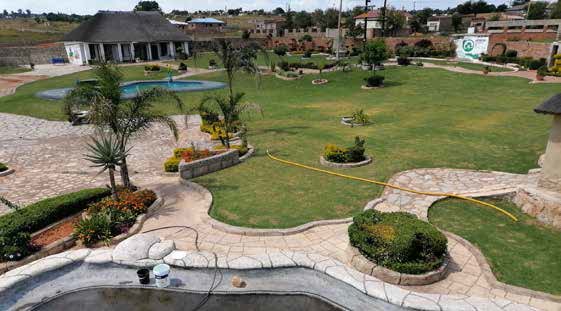
NtoSifiso Primary Cooperative is a 100% youth-owned events management and project business, trading as NtoSifiso Garden.
It was established by Nonkululeko Masango and cousins Sandile, Xolani, Sfiso and Nkosinathi Mbokane in 2015, but was only registered in 2018.
The business started after the youngsters realised that residents of their community loved taking photos in the flower garden at one of their homes.
“People used to come to my mother’s house and ask to pose for pictures in the garden. We realised that this was becoming a habit and started charging them R50 to access our garden,” says Sfiso (35), who is the cooperative’s operations manager.
From there, the group saw an opportunity for a lucrative business.
“We drafted a business plan and approached the Ndebele King to ask for land opposite my home, which was previously used as a dumping site. We were granted permission to use the land so we cleaned it up and turned it into a venue for events,” he adds.
The business occupies over 10 hectares of land and offers a venue for weddings, parties, picnics and social gatherings. It has swimming pools and a braai area and catering services are provided on request.
The cooperative has received training and funding support from the National Youth Development Agency (NYDA).
“We received a business grant of R50 000 and bought a quality sound system so that we can entertain our guests and give them more value for their money,” he says.
Sfiso encourages young people, especially those who are unemployed, to get together and start cooperatives to create jobs for themselves and their peers.
NtoSifiso cooperative has created employment for 17 people, including the co-founders.
To register a cooperative, contact the Companies and Intellectual Property Commission’s call centre at 086 100 2472.
To find about NYDA funding, contact the NYDA at 087 1586 345 or go to www.nyda.gov.za
Electronic Vaccination Data System
Electronic Vaccination Data System Sibonelo
Encouraging ECD centres to grow
Encouraging ECD centres to grow SiboneloGrow Educare Centres (Grow) has established a new programme to help early childhood development (ECD) centres in low-income areas become more professional and financially sustainable.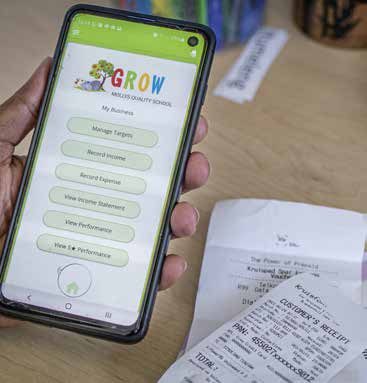
The non-profit organisation is calling on all ECD facilitators to join its new 5 Steps to 5-Star ECD programme, which will give them free access to a mobile app that has tools to help them manage their journey of becoming a 5-Star early learning centre, measure their performance and access training content.
Chief Executive Office of Grow Tracey Chambers says many ECD centres lack professional staff or the right resources required to educate and care for young children.
“Grow has a long history of operating high-quality ECD centres in vulnerable and under-served communities.
“Now we are sharing our technology, expertise, systems and tools with early learning facilities across all communities to help build and shape the broader ECD sector for the better. This is our gift to the ECD sector,” she says.
Sign up for Step 1
Step one of the programme provides free access to custom-built Grow mobile apps for principals, teachers and parents. It also provides other ECD tools and data-free online training.
“It is available to all ECD owners, irrespective of their affiliation to other ECD support organisations, socio-economic standing or registration status. These apps will help them manage their entire preschool from the palm of their hand,” says Chambers.
The principal/owner app includes various functions, such as learner and staff attendance, income and expense trackers, professional learner assessments and reports, teacher assessments, a parent communications portal and performance tracking against the 5-Star standards.
The mobile technology is designed for Android devices, can work in offline mode and uses very little data.
Centres also receive access to data-free online teacher training (12 modules) for all of their teachers and assistants to support their professional development.
The Grow model has five steps:
- Step 1: Access to technology, including the Grow App, tools and online training.
- Step 2: Quality education programme. Centres can apply for the Grow daily programme, education equipment and advanced teacher training and mentorship, through an affordable micro-loan.
- Step 3: Business growth programme. Centres can apply for infrastructure upgrades, registration support and business mentorship.
- Step 4: Grow 5-Star certification.
- Step 5: Grow branding.
For more information, visit www.growecd.org.za and click on ‘Join Grow’ or call 021 531 2134.
Energy deal to produce fuel from waste
Energy deal to produce fuel from waste JoyMpumalanga-based non-profit organisation (NPO) Africa Green Earth will soon start with a waste recovery and green energy deal with Barberton Mines.
The deal, which was signed in October 2020, will see the NPO use plastic and other recyclable materials to produce oil and fuel that will be used by three of the four mines that fall under the Barberton Mines group.
 Africa Green Earth project mentor and Director of Operations Benjamin Jack Magongo says the project started in 2019.
Africa Green Earth project mentor and Director of Operations Benjamin Jack Magongo says the project started in 2019.
“We’ve been separating waste at source for rural communities since 2013 and using recycled materials to manufacture clothes, artwork and other valuable materials.
“In 2019, we started negotiating with the three mines to collect waste from their premises. We will then mix it with the other waste materials collected from communities to make the oil, which will be sold back to the mines,” he explains.
Magongo says the deal includes the Consort Mine, Sheba Mine, Fairview Mine, the PET Recycling Company and Mbombela Municipality.
The process of turning waste products into fuel and oil, known as pyrolysis, sees high heat, pressure and water used to break down plastic and convert it into oil. Most plastics are originally made from oil, so the process converts them to their original form.
While the lockdown imposed as a result of the Coronavirus pandemic delayed the project, it is now back on track.
Norman Hartman, the Barberton Mines Manager for Community Support said the deal is still in the pilot stage.
Magongo explains that the next phase will be to implement the system that converts waste to paraffin, diesel, power and electricity.
“This phase will produce about 12 permanent jobs and create a sustainable environment for local economic growth for waste pickers at Barberton landfills and for street waste traders.
“This can be a cost-saving exercise for the mines, as the fuel is cheaper than ordinary fuel,” he says.
Magongo says the deal is one of the NPO’s biggest accomplishments.
“Not many rural buy-back centres have a job creation initiative towards energy-efficient green production,” he adds.
Growing small businesses and rural tourism
Growing small businesses and rural tourism JoyThe Tourism Grading Council of South Africa (TGCSA) is rolling out the pilot phase of the Basic Quality Verification (BQV) Programme in the Eastern Cape. This is to give emerging entrepreneurs and small business owners an opportunity to grow their businesses.
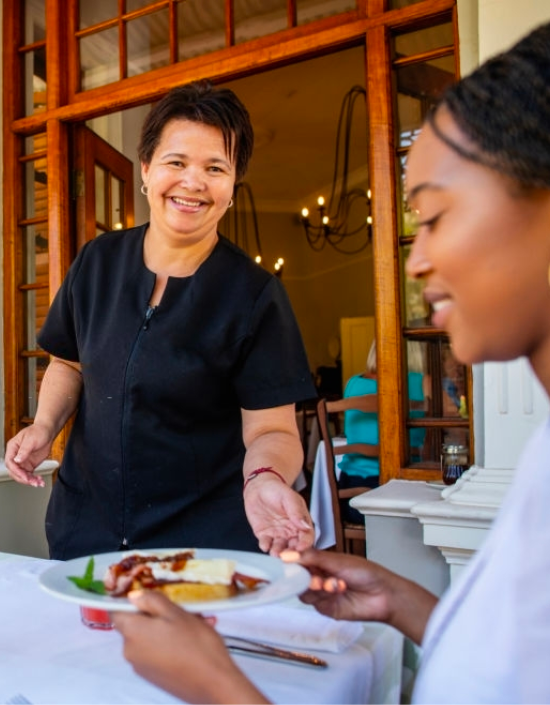 The TGCSA, a business unit of South African Tourism, is rolling out the programme’s pilot phase to 68 homestay establishments to help them prove that they are proper businesses that offer quality accommodation.
The TGCSA, a business unit of South African Tourism, is rolling out the programme’s pilot phase to 68 homestay establishments to help them prove that they are proper businesses that offer quality accommodation.
As international markets are unaware of the diversity and affordability South Africa has to offer, the programme will help establishments better market themselves to domestic and international tourists.
Each establishment has to comply with certain criteria before they can qualify for BQV certification.
This includes being a legally registered business that complies with the Broad-based Black Economic Empowerment codes, meeting global safety and comfort standards and complying with global cleanliness and Coronavirus Disease (COVID-19) hygiene standards.
“The BQV Programme will ensure that all accommodation products, including those in rural areas and townships, have a formal quality assurance level in place, thus highlighting the importance that South Africa places on service excellence and providing a quality experience to tourists,” says SA Tourism Chief Executive Officer Sisa Ntshona.
He explains that South Africa has many unexplored hidden gems, especially in villages, small towns and dorpies (VSTDs), and the BQV Programme is a starting point to formalise homestays in the country.
This will enable travellers to enjoy unique and authentic tourism experiences in and around VSTDs as the programme will raise their profile.
Once the pilot programme is successfully completed, it will be rolled out to all provinces.
Unemployed graduates trained
To promote inclusive economic growth in the tourism sector, the BQV Programme will train unemployed tourism graduates as evaluators in the areas in which they live.
“Youth development is extremely urgent in our sector, especially at this time when our country is facing a high rate of unemployment that’s compounded by the effects of the COVID-19,” says Ntshona.
The training will provide youth with the entrepreneurial skills and technical specialisation they need to be accredited assessors in future.
For more information about TGCSA grading, go to www.tourismgrading.co.za.
Increasing access to justice
Increasing access to justice SiboneloA new court in KwaZulu-Natal is set to revolutionise justice services, allowing for the community to apply for protection orders online.
The new Point Branch Family Court marks an important step in the country’s fight against gender-based violence (GBV).
Speaking at the official opening of the court, Minister of Justice and Correctional Services Ronald Lamola said the court will be the first in South Africa where domestic violence survivors can apply online for a protection order.
“In this court, we introduce much welcome innovation in our quest to drive our justice system towards an effective response to GBV.
“We hope to learn important lessons from this pilot as we prepare to roll-out a more comprehensive version throughout the country,” he said.
Located in Durban, KwaZulu-Natal, the court enables the community to access a variety of family services at one point.
It offers legal services related to domestic violence, maintenance, children’s court and protection from harassment, among others.
“The branch court concentrates on a basket of services that were accommodated at the Durban Magistrate’s Court, which has and continues to serve the KwaMashu, Umlazi, Chatsworth and Phoenix communities,” explained the Minister.
The Family Court was previously located at the Durban Magistrate’s Court, where there were severe spatial challenges.
Communities can now access services in a more secure and private atmosphere that promotes and maintains human dignity, while ensuring an environment that is victim- and child-friendly.
The court consists of six family courtrooms, with expanded waiting rooms.
Minister Lamola added that through this court, the department is demonstrating a shift towards gender sensitive courts. Most of the court’s features are designed to not only dispense justice, but to also achieve it with women’s needs in mind.
“Through this court, we will implement the National Strategic Plan on GBV and Femicide.
“We address underlying problems with the implementation of the Domestic Violence Act, the Maintenance Act, and other pieces of progressive legislation, such as the Children’s Act, Promotion of Equality and Prevention of Unfair Discrimination Act, Employment Equity Act and the Protection from Harassment Act,” he said.
Jubilee Hospital facelift eases patient pressure
Jubilee Hospital facelift eases patient pressure SiboneloA new training facility, CT scanner and renovated ward at Jubilee Hospital will result in better patient care.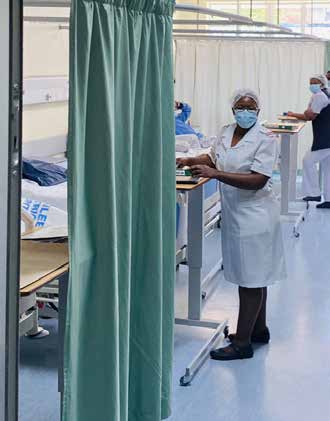
Jubilee Hospital in Hammanskraal, Gauteng, has undergone a major facelift and expansion that will see it not only increasing its capacity to handle patients, but also becoming a training facility for medical students.
The Gauteng Department of Health recently unveiled the renovated ward, computerised tomography (CT) scanner and a training lab to be used by medical students.
Gauteng Health MEC, Dr Nomathemba Mokgethi, said the improvements will ease the constant burden on the hospital.
“Because of the hospital’s close proximity to the N1 and R101 roads, it has been flooded by trauma and emergency cases as a result of car accidents,” she noted.
The renovated ward 4, with 31 allocated beds, will improve the hospital’s capacity to handle these cases. The ward was previously closed and will now be used as an orthopaedic ward.
In 2020, the hospital was earmarked to provide Coronavirus Disease services and received an alternative building technology structure with 300 beds.
“The addition of 300 beds to the hospital’s existing 551-bed capacity means it is growing not only in terms of size, but in offering more services to the community.
“At present, the hospital is admitting all surgical patients, including general surgery, orthopaedics, urology, ophthalmology and gynaecology, to the same ward. We will now be able to separate the various units,” said Jubilee Hospital Acting CEO, Dr Olebogeng Modise.
The new CT scanner will also mean fewer transfers to Dr George Mukhari Academic Hospital.
A CT scanner enables doctors to examine patients internally through X-ray images taken from different angles. Images of bones, blood vessels and soft tissues can be obtained, thereby providing more detailed information than plain X-rays.
“We are now able to admit more trauma patients and with the CT scanner, we can deal with trauma cases quicker than we were able to in the past,” said Dr Modise.
The training facility will be used to train medical students in various fields, including surgery, emergency medicine and obstetrics.
Know your labour rights
Know your labour rights JoyWorkers’ Day on 1 May provides an opportunity to reflect on the rights of employees in South Africa.
While South Africa’s Constitution and labour laws ensure that workers’ rights are protected, it is important that all people know their basic workplace rights.
The Basic Conditions of Employment (BCE) Act prescribes certain minimum conditions of employment which must be adhered to by both the employer and the employee.
These rights can be enforced by both the worker and the employer, be it a private company or a state entity.
The Director of Mosikare Attorneys, Naledi Mosikare (34), says that these rights are a basic requirement for the an employer and employee relationship.
Employees in South Africa are entitled to compensation, which is agreed on upfront, for work done.
This compensation may not be lower than the current minimum wage of R21.69 per hour, as spelled out in the National Minimum Wage (NMW) Act of 2018.
The BCE Act stipulates the number of working hours; the lunch and break times; the minimum amount of the different leave days; and other basic conditions of employment.
Mosikare says these laws and rules protect employees from being exploited while at the same time ensuring that employers get what they pay for.
“The law also requires employers to register employees with the Compensation Fund in case they are injured on duty.
“Employees are guaranteed safety in the workplace and when the employer does not adhere to that, the worker can work within these laws to enforce the implementation of their rights.”
How to handle grievances
Mosikare says that employees should engage employers when they feel their rights are not being respected. This can be done through meetings that are recorded in official minutes.
When internal communication fails between the employer and worker, there are other alternatives for resolution, such as the Commission for Conciliation, Mediation and Arbitration (CCMA).
The dispute resolution body can help both parties come to an agreement and offer judgments when a dispute remains unresolved after the CCMA’s intervention.
Wage disputes can be negotiated and settled through the National Bargaining Council or the Public Service Coordinating Bargaining Council, for those working in the public service.
“These structures ensure that employees and employers are able to negotiate compensation fairly and protect the rights of the employees,” Mosikare explains.
Employees whose labour rights are not being respected can also approach their local Department of Employment and Labour.
For more information, go to the department’s website - www.labour.gov.za – or call 012 309 4000.
Contact the CCMA at 011 377 6650 or go to www.ccma.org.za
Local automotive industry breaks stereotypes
Local automotive industry breaks stereotypes JoyIsaac Boshomane, the owner of Kgabo Cars in Gauteng, opened his business to provide opportunities to youth interested in car mechanics.
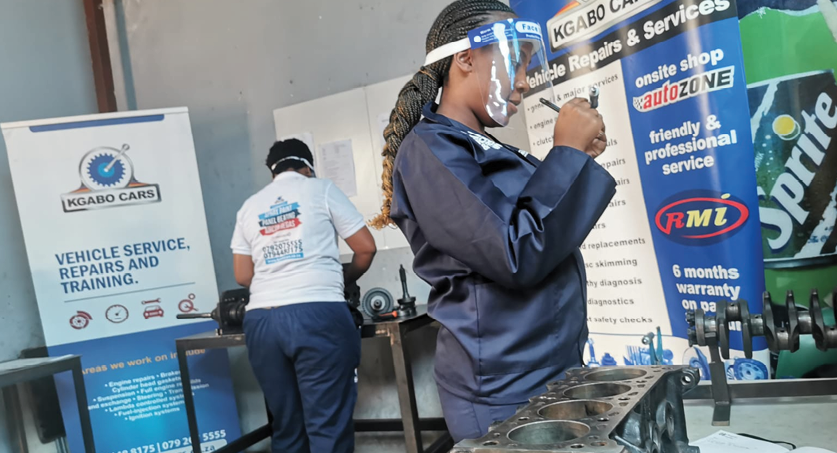 The workshop, which has been operating for 20 years and offers car services, repairs and maintenance, enlists students from technical and vocational education training colleges for the work-integrated component of their studies.
The workshop, which has been operating for 20 years and offers car services, repairs and maintenance, enlists students from technical and vocational education training colleges for the work-integrated component of their studies.
“When the students complete their training, they don’t need to go anywhere to prepare for their trade test. We have a one-stop-shop. There’s the training side, which we call institutional training and the workshop side for the experience,” says Boshomane
He adds that if entrepreneurs across the country copied his model, the fight against unemployment would yield significant results.
After formalising his recruitment programme, his workshop was approved by the Manufacturing, Engineering and Related Services Sector Education and Training Authority (MerSETA). The authority plays a central role in the country’s National Skills Development Strategy.
“We have two streams for apprentices to become qualified artisans. The co- mpetency-based module training from Level 1-4 and the workplace-approved training in automotive repair and maintenance Level 2-4. After our training, they go for trade tests,” explains Boshomane.
His workshop has also trained a number of female recruits who are often stereotyped as ill-fitted for the automotive industry.
“Women can also play a crucial part in the automotive industry and they have proven that. The 16 females we have trained at Kgabo Cars are doing well and are working as motor mechanic artisans,” he says.
One recent graduate, Esther Tibane, says: “I’m fascinated with solving car problems. With the other seven women I’ve been training with, we’re breaking stereotypes about jobs previously meant for men."
Another female graduate, Julia Ramawela, says she has already registered her workshop and will work with other female mechanics.
According to Boshomane, the measure of his success is not based on income, but on equipping the youth with skills to earn a living.
“It is the little contribution my team and I are making, both in the automotive industry and in the education sector, to prevent young people from doing drugs and being economically inactive,” he adds.
Making social work count
Making social work count SiboneloSocial workers play an important role in the fight against gender-based violence and femicide (GBVF).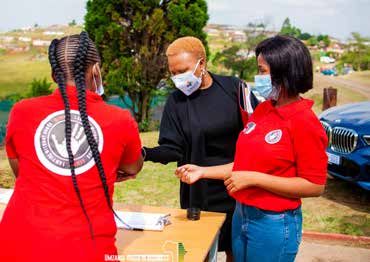
Minister of Social Development Lindiwe Zulu paid tribute to the work being done by social workers when she conducted an outreach programme in Pietermaritzburg, KwaZulu-Natal, recently.
She said social work is at the heart of government’s work to build a more humane and caring society.
“From large caseloads, a lack of necessary tools of trade and increased social ills, such as GBVF and substance abuse, social workers are increasingly called on to respond to a myriad of socio-economic challenges confronting our young democracy.
“In the midst of the lockdown, I witnessed social workers on the frontlines of our national response going beyond the call of duty by providing much-needed services under the most difficult circumstances,” she added.
The Minister said one of the key issues that needs to be addressed is the high number of unemployed social work graduates.
“This is a serious concern for us, especially with the rising social ills in our country.”
During the Coronavirus pandemic, the department absorbed 1 300 social work graduates into the system, on a three-month contract.
After three months, over R75 million was made available as part of President Cyril Ramaphosa’s Employment Stimulus Package to keep the graduates employed until the end of Mach 2021.
“We must commend provinces, such as the Free State, which absorbed these social workers permanently. We call on other provinces to do the same,” said Minister Zulu.
The department is in discussions with other stakeholders in the sector to determine how more graduates can be absorbed.
Minister Zulu’s outreach programme also focused on GBVF hotspots and mobilising young people to play their part as agents of change, by promoting a culture of respect for human rights, gender equality and GBVF prevention.
The Minister also officially opened the Umzansi Youth in Business Digital HIV and Resource Centres in Sweetwaters, which will assist youth with various aspects of development, including business research, printing of CVs, training for interviews and inclusion in various social behavioural change programmes
NPA tackles corruption
NPA tackles corruption SiboneloThe NPA is taking action against those implicated in corruption.
The National Prosecuting Authority (NPA) is making significant strides in fighting corruption through its Investigating Directorate (ID).
The head of the NPA, Advocate Shamila Batohi, says the ID was established by President Cyril Ramaphosa to deal with corruption cases that arise from judicial commissions of inquiry, among others.
These cases include those arising from the Judicial Commission of Inquiry into Allegations of State Capture, Corruption and Fraud in the Public Sector, including Organs of State, the Commission of Inquiry into Tax Administration and Governance by the South African Revenue Service and the Commission of Inquiry into Allegations of Impropriety regarding the Public Investment Corporation.
Batohi says the directorate has identified priority cases to investigate, prosecute and, where possible, recover assets, in a number of sectors, including state-owned entities (SOEs), the security sector and high-profile public and private cases.
A number of the cases before the court have been reported in the media, including that of Bosasa former Chief Operations Officer Angelo Agrizzi; former National Commissioner of the Department of Correctional Services, Linda Mti; and the former chairperson of the department’s portfolio committee, Vincent Smith.
“On 26 February 2021, the court granted the ID a forfeiture order of R46 million against Smith’s assets, his family trust and a portion of his daughter’s assets for suspected tax liability, fraud and unauthorised gratifications,” says Batohi.
In SOE-related matters, Batohi says the ID focused on charges relating to R745 million corruption against former senior executives and the businessmen they allegedly colluded with to defraud Eskom’s Kusile Power Station.
In the security sector, one of the prominent cases before the court is the R47 million Soccer World Cup fraud and corruption matter involving KwaZulu-Natal businessman Toshan Panday and eight others.
“The matter was recently transferred to the Durban High Court and a racketeering indictment was produced, alleging that the acts were more than just corruption, but a syndicate to defraud the State,” says Batohi.
She adds that many of the cases the ID is dealing with are complex and could take some time to finalise.
The public is encouraged to report any suspected corrupt activities by emailing ID_LEADS@npa.gov.za
New certification and exam fees
New certification and exam fees SiboneloDid you know that you can apply to the Department of Basic Education to have your National Senior Certificate and other examination-related documents re-issued if they have been lost?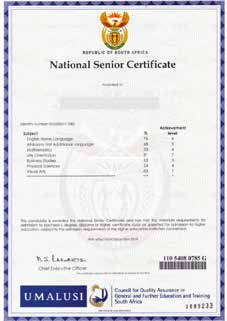
The department recently announced its revised tariffs for the re-issuing of certificates and examination-related fees.
Here is what these services will cost you over the next three years:
- Replacement and re-issue of a Senior Certificate/National Senior Certificate - R141 (2021/22), R153 (2022/23) and R164 (2023/24).
- Changes or amendments to certificates (re-issue) - R141 (2021/22), R153 (2022/23) and R164 (2023/2024).
- Confirmation document issued prior to the certificate (system-generated document) - R52 (2021/22), R55 (2022/23) and R57 (2023/2024).
- A letter to an embassy and authentication of qualifications (work/study abroad) - R52 (2021/22), R55 (2022/23) and R57 (2023/2024).
- Re-issue of a statement of results (provincial) - R52 (2021/22), R55 (2022/23) and R57 (2023/2024).
- Replacement of standards 6, 7, 8, 9 and 10 practical certificates - R141 (2021/22), R153 (2022/23) and R164 (2023/2024).
- Replacement of a teacher’s certified statement/diploma - R141 (2021/22), R153 (2022/23) and R164 (2023/2024).
- Statement for a teacher qualification - R52 (2021/22), R55 (2022/23) and R57 (2023/2024).
- Verification of qualification prior to 1992 for government organisations - R52 (2021/22), R55 (2022/23) and R57 (2023/2024).
- Verification of qualification prior to 1992 for non-government institutions - R75 (2021/22), R79 (2022/23) and R82 (2023/2024).
Below is the cost of an application to view your exam scripts or to have them remarked and rechecked:
- Re-mark - R104 (2021/22), R110 (2022/23) and R116 (2023/2024).
- Re-check - R25 (2021/22), R27 (2022/23) and R29 (2023/2024).
- Viewing - R200 (2021/22), R212 (2022/23) and R220 (2023/2024).
To apply for these services, contact the department at 012 357 4511/3, or the call centre at 0800 202 933.
For more information for these services and others rendered by the department, go to www.education.gov.za
Port of Durban creates a sea of opportunities for SA
Port of Durban creates a sea of opportunities for SA SiboneloRecently, I visited the Port of Durban to see for myself the work being done to make the port more efficient and competitive.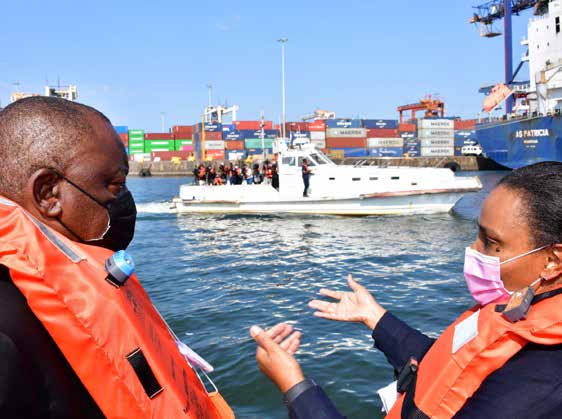
After a briefing with the senior management of Transnet, I toured the harbour in a pilot boat, which is usually used to guide large ships through the entrance channel to the pier.
Seeing the workings of the port from the water, one is reminded of its vast scale and complexity.
If the port does not function efficiently, the entire economy suffers, from importers and exporters to consumers.
On the other hand, if the port works well it can drive economic growth and position our country as a gateway to the region and the continent.
When I visited Durban in October 2019, many local businesses and port users raised concerns with me about the performance of the Durban Port.
Shipping companies, in particular, expressed concern about truck congestion and waiting times, ship berthing delays and anchorage times, poor maintenance of equipment and generally low productivity in the port.
My recent visit to the port was to check whether the commitments made in response to these concerns had been implemented.
There has indeed been great progress over the past year in turning around the performance of the port, despite the impact of COVID-19.
These efforts are already showing results in improved maintenance of equipment, reduced congestion, quicker turnaround times and increased use of rail instead of road transport.
While this is important progress, there is still much work to be done to position Durban as a world-class port and as a hub port for the Southern Hemisphere.
In recent years, the port has slipped from its position as first in Africa to third, behind Tangier in Morocco and Port Said in Egypt.
Truck turnaround times have greatly improved. Similarly, the reliability of cargo handling equipment has improved to 80% and is heading towards at least 95% to meet international benchmarks. Ship waiting times have reduced to impressive levels.
These statistics may seem technical and obscure, but they have a direct impact on the growth of our economy and on the prices we pay as consumers.
We have made improving the efficiency of our ports a priority of Operation Vulindlela and have focused on rebuilding Transnet, which is one of our valued state-owned enterprises.
The new management of Transnet and its operating divisions are resolutely focused on turning the performance of the port around.
The management has ambitious and exciting expansion plans for all five of the port’s precincts.
These include the deepening of the Maydon Wharf channel to allow larger, modern vessels to enter the port, the infill of Pier 1 and Pier 2 to create additional capacity for containers and the development of a new container terminal in the Point Precinct.
Altogether, the expansion of infrastructure at the port will require R100 billion in new investment over the next decade and more. This will completely transform the port, expanding its capacity for container handling from 2.9 million units to more than 11 million units.
These ambitious plans will require greater private sector participation and investment.
Transnet, including the Durban Port, is an important national asset belonging to the people of South Africa.
Partnerships with the private sector are crucial to bring new investment, technology and expertise to port operations and to modernise equipment and infrastructure.
Transnet is planning, for example, to advertise a concession later this year to build and operate the new Point Terminal. This will bring in private investment and improve the efficiency of container handling.
Through our reform process we are steadily improving the efficiency of our ports and railways and unlocking massive investment in infrastructure. This will not only lower costs and improve the competitiveness of our exports, but will create thousands of new jobs in the process.
Through both operational improvements and structural reforms, Durban Port will reclaim its place as the best-performing port in Africa.
As part of our Reconstruction and Recovery Plan, we will continue to work tirelessly to expand infrastructure investment and transform our network industries.
If my visit to Durban left one thing in my mind, it is that we South Africans are capable of succeeding in projects of vast importance and scale.
Our ambitions should match the size of our challenges.
With the progress we are making at the Durban Port, with the reinvigorated skills and capabilities that we have in Transnet, we now have the wind in our sails. And we are moving at a rate of knots towards our destination.
SA Youth networking for progress
SA Youth networking for progress SiboneloAre you between 15 and 34 years old and looking for learning and earning opportunities? Then you need to join SA Youth - a national network for all young people to access opportunities for free.
The National Youth Development Agency (NYDA) has partnered with the Presidency, through the Presidential Youth Employment Intervention, to launch SA Youth.
Other partners involved in the project include Harambee Youth Employment Accelerator, government departments, the private sector and civil society.
This initiative is one of the ways through which government is addressing the high rate of youth unemployment, which President Cyril Ramaphosa idenitifed as a prority of government.
“We must ensure that the most marginalised youth have the support to access opportunities – young people who’ve been unemployed for a long time, who cannot afford the costs of searching for work and who lack strong social networks,” the President said.
He added that government is prioritising the creation of a network for young work seekers to access learning and work opportunities, receive support and work readiness training, and be matched to employment and other economic opportunities.
Through the SA Youth network, young people get free access to online work-seeker support resources. These include:
- Hustling resources.
- Preparation for the world of work.
- Learnership, volunteering and further studies resources.
- Wellness and selfcare support.
The youth can apply for safe and trusted job, volunteer, learnership, bursary and work experience opportunities in their area on the mobi-site – www.sayouth.datafree.co – which is data free. This means that you don’t have to have data to access any of the SA Youth resources.
How to join SA Youth network:
- Go to https://sayouth.datafree.co/p/nyda
- Enter your ID number – if your ID already exists, you may have previously registered with SA Youth, Harambee or Tshepo Million. If this is the case, go back, click on login, enter your ID number and existing password.
- Once you’ve registered and accepted the T&Cs, complete the questions.
- Click on an opportunity and apply.
- Click on the profile icon to add information like education qualifications and/or work experience.
SA contortionist aims for global success
SA contortionist aims for global success JoyThirteen-year-old Sesona Tshume from Qonce (formerly King William’s Town) in the Eastern Cape has set her sights on becoming a world-class contortionist – despite the art form not being popular in South Africa.
 She is proof, that no matter your age or the challenges, you can follow your dreams.
She is proof, that no matter your age or the challenges, you can follow your dreams.
Contortionists are able to twist their bodies into unusual postures and often become performing artists.
Sesona, a Grade 7 learner at Kingsridge High School for Girls, says her interest in contortion was sparked after she saw a YouTube video of Australian contortion twins Teagan and Samantha Rybka in 2020.
“In July, I started practising every day. This is really something I would like to do.
“When I do contortions, it makes me happy and really soothes me. I would like to be a YouTube contortionist and teach other kids,” she says.
Her mother, Zukiswa Tshume (47), says that while she always knew her daughter was extremely flexible, she was not happy with her new interest.
“I didn’t like it when she did her moves. My fear was that she would sprain her muscles or break her bones.”
In December, Sesona’s brother took a video of her, edited it, and uploaded it to a YouTube channel he had created for her.
The siblings sent the link to their mom and she was impressed with her daughter’s passion.
“She’s a determined, loving and respectful young lady. She showed me that she really loves contortion. That’s when I started to support her,” says Zukiswa.
While Sesona is working on her skills, the challenge now is finding a professional trainer to help her develop further.
“Where we are staying, there are not even gymnastics classes. The only place that was willing to help us was in East London, over 50km away, and classes are only offered on weekdays.
But Sesona is not letting any challenges get in her way and has set her sights on competing internationally.
To view Sesona’s videos on YouTube, search for Sesonathecontortionist.
SIU opens office in Northern Cape
SIU opens office in Northern Cape SiboneloGovernment has strengthened its efforts to fight corruption with the opening of the Special Investigating Unit’s (SIU) Northern Cape Provincial Office.
The Northern Cape was the only province in South Africa without a permanent SIU presence. Instead, it was serviced by the Free State, North West and Western Cape provincial offices.
The SIU is an independent body that conducts investigations at the President's request. It recovers and prevents financial losses to the State caused by acts of corruption, fraud and maladministration.
Minister of Justice Ronald Lamola said the opening of the new office is expected to improve the turnaround time of investigations and help ensure good legal outcomes and effective implementation of SIU recommendations.
He added that the rate of reporting to the SIU in the Northern Cape is low when compared to other provinces.
“This is understandable taking into consideration that the SIU did not have offices here. However, this should be a thing of the past, I appeal to members of the community to fully utilise these offices and report all allegations of corruption.”
Minister Lamola said the Coronavirus Disease (COVID-19) period has shown that corruption knows no boundaries, with public money meant to fight the pandemic being lost to corruption.
He applauded the SIU for ensuring that those who looted public resources were brought to book.
The Minister gave an update on recent anti-corruption developments These include:
- The establishment of the Special Tribunal has enhanced the SIU’s ability to recover funds stolen from the State. The biggest recovery to date – R1.5 billion – is against ABB South Africa.
- Law enforcement agencies coordinating their work through the Fusion Centre have handled 231 cases or incidents related to COVID-19. Thirty cases were closed after investigations and 31 accused are appearing in 14 criminal cases across the country. Referrals were sent to various departments for disciplinary action of employees involved in irregularities.
- R145.6 million in 72 bank accounts has been blocked by the Financial Intelligence Centre and R119 million has been preserved by the Asset Forfeiture Unit through the Prevention of Organised Crime Act.
- The SIU has enrolled cases in the Special Tribunal to the value of R365 million and has saved R124 million involving supply chain irregularities. The South African Revenue Services recovered R165 million in taxes.
To report fraud and corruption, contact the SIU at siu@whistleblowing.co.za or 0800 037 774.
Shaping the furniture sector's future
Shaping the furniture sector's future JoyCarpentry experts are hammering out a stable future for themselves and their communities.
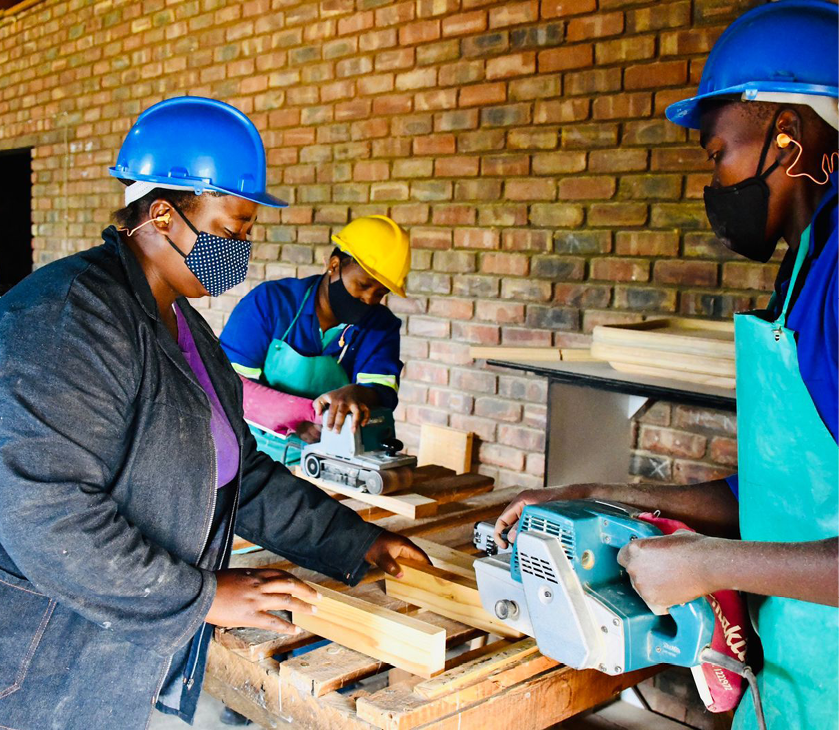 Young people from Vhulaudzi Tshitavha village in Makhado, Limpopo, are crafting a brighter future for themselves by making furniture.
Young people from Vhulaudzi Tshitavha village in Makhado, Limpopo, are crafting a brighter future for themselves by making furniture.
They have formed the Limpuma Furniture Cooperative, which makes a range of furniture, including beds, chairs, coffee tables, kitchen units, podiums, benches and school desks, as well as coffins and jungle gyms.
Chairperson Mpho Neluheni (33) says the cooperative supplies local furniture shops, sells directly to members of the public and also custom make individual pieces. Their favoured wood is pine and oak.
The cooperative is planning to expand its operations after building a new workshop that will replace the old community centre they have been using since they started operations in 2015.
Plans to expand
With the ramp-up in production as a result of the new workshop, Limpuma Furniture Cooperative plans to open at least two retail shops in the next seven years.
“As part of growing the business, every month-end we go sell our products in the town of Makhado. We are also in the process of negotiating with various additional stores to start selling our products,” says Neluheni.
Phumzile Mashego (28), a member of the cooperative, says that the business helped her send her child to a better school and support her mother.
She recalls that before joining the cooperative, she was unemployed.
Mashego met the other founding members of the cooperative when they took part in a one-year carpentry learnership offered by state-owned forestry company South African Forestry Companies Limited (SAFCOL).
After the learnership ended, some of the participants were approached by SAFCOL and helped to start their own company, which gave rise to the cooperative.
It cost about R300 000 to start the cooperative and it benefited from funding of R500 000 from the Department of Social Development.
Members of the cooperative also received business development training and assistance with quality and operational management through the Small Enterprise Development Agency.
The cooperative’s current annual profit is R500 000.
Ambani Ndou (28), a Limpuma Furniture Cooperative intern, has big dreams after gaining skills during his time at the cooperative.
“Now I am able to make various pieces of furniture. After completing my internship here, I am planning to open my own workshop,” he says.
Local businesses are also benefiting from having the Limpuma Furniture Cooperative in their backyard. They are able to source furniture and coffins closer to home, saving them on transportation costs.
SAFCOL upskills communities
SAFCOL’s learnership programmes help ensure that skilled individuals are available to the sector in the future, while also addressing poverty and unemployment, especially in the communities surrounding its areas of operation.
The learnerships mainly benefit previously disadvantaged individuals, people living with disability, black females and youth.
In addition to the one-year SAFCOL learnership that members of the Limpuma Furniture Cooperative underwent, the forestry company has helped the cooperative to acquire technical and business skills.
In addition, as part of its ongoing partnership with SAFCOL, the cooperative secured a contract to manufacture school desks that SAFCOL donated to rural schools.
SAFCOL representative Helen Seloane says the company assisted the cooperative to acquire technical and business skills.
“We have offered them the necessary support they needed so they can be able to run the business efficiently,” she says.
Furniture Industry Masterplan
After successfully maximising the opportunities given to it through state programmes, Limpuma Furniture Cooperative is now well positioned to benefit even further from government efforts to grow the economy.
The cooperative and other emerging players in the furniture manufacturing sector will benefit from government’s Furniture Industry Masterplan.
The plan was established to set clear guidelines and targets for the industry and to guide public sector procurement as part of efforts to support and stimulate the industry.
In March, Trade, Industry and Competition Deputy Minister Nomalungelo Gina said the masterplan has the potential to reposition the sector.
“It is one of the most labour-intensive industries, with a potential to contribute to the reduction of unemployment and increase the export and development of small, medium and micro enterprises,” said the Deputy Minister.
The masterplan is centred on three pillars: market access, transformation and the improvement of competitiveness. Its aims is to build a fast-growing, profitable, inclusive and sustainable furniture industry, and increase local production by 50% by the end of 2021.
To find out more about the SAFCOL learnership, call 012 436 6300 or go to www.safcol.co.za
Spaza shops go digital
Spaza shops go digital JoyFree State residents and the founders of tech company Next Curve Creations - Tumi Letsaba, Kgomotso Sebitlo, Ditjhaba Selemela and Bandile Ntombela - have created a mobile app that will help spaza shop owners operate more efficiently.
 Called Progressive Creations, the app is intended to help store owners unite to benefit from bulk buying. It will also help individual owners keep better inventory records.
Called Progressive Creations, the app is intended to help store owners unite to benefit from bulk buying. It will also help individual owners keep better inventory records.
At present, the app is being tested among a closed user group of spaza shop owners in Frankfort.
“We realised that retailers struggle with gaining access to fast-moving consumer goods manufacturers and to organise themselves to access manufacturers.
“After many casual chats with local owners in Namahadi, Frankfort, we decided to create a platform that would improve their business," says Letsaba
The app will help owners contain expenses and increase access to the marketplace.
A study by the Sustainable Livelihoods Foundation and the Institute for Poverty, Land and Agrarian Studies showed that spaza shops are critical contributors to local food security, self-employment and community cohesion.
However, after surveying 1 100 township grocery retailers across all nine provinces, the study found that the sector has undergone extensive change and owners are battling to adapt.
Being a group of young men experienced in tech, finance and business, Letsaba says they view the app as the best way forward.
“The app offers township businesses an opportunity to adapt to the Fourth Industrial Revolution. Technology has a huge impact on our daily lives and to keep up with current trends, we believe that our people need the opportunity to adapt.”
The app has barcode-scanning capabilities which will assist with proper stocktaking.
“When someone buys a certain item, you can scan the barcode and it will update the stock. You’ll be able to view sales and stock levels.”
The team – which has now been granted an opportunity to be part of the Black Umbrellas, a body that seeks to develop, mobilise and connect entrepreneurs - aims to launch the app across the country once it has been refined.
Thanking our nurses
Thanking our nurses SiboneloThe country’s nurses, along with other medical staff, have put their lives on the line to help others during the Coronavirus Disease (COVID-19) pandemic.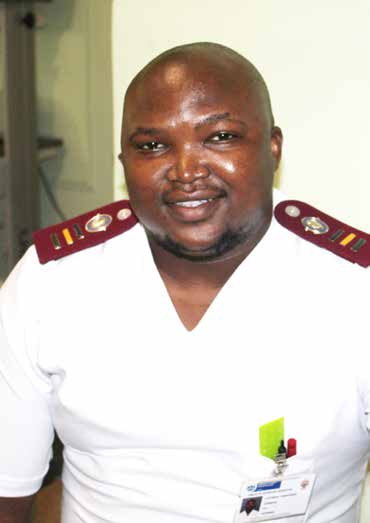
International Nurses Day, which is on 12 May, is an opportunity to celebrate nurses for their service to others.
Professional nurse Luyanda Ganuganu (25), from Groote Schuur Hospital in the Western Cape, says the day is also an opportunity for nurses to continue to shine the bright light of their profession.
“It’s an opportunity for nurses to be recognised, but we must continue to provide quality care, especially during the pandemic,” he says.
Ganuganu was on the frontline during the pandemic’s first and second wave, working at the hospital’s high care COVID-19 ward.
“The best part was the experience gained while working with patients, but the worst part was all the deaths that took place in the ward. Emotionally, that was not easy.”
Ganuganu, who has been a professional nurse for the past two years, chose the profession because he loves helping people.
“I grew up in a rural area in the Eastern Cape and could see how people struggled due to a lack of clinics with nursing care. This developed my passion for wanting to make a difference,” he says.
During the pandemic, Ganuganu has had to learn to work under pressure.
“Decisions have to be made quickly and you have to think on your feet. I also learnt how to communicate with patients,” he adds.
Ganuganu found it very difficult to go to work during the second wave. While he wanted to help others, he also feared for his own family.
“I got married in December 2020 and my wife is pregnant. I have seen a lot of pregnant women die in the COVID-19 ward. I had to be even more careful because I did not want to put my wife’s life in danger,” he says.
Ganuganu is grateful to his managers and colleagues.
“I want to thank them for their support and for giving me the opportunity to grow as a nurse. It’s an awesome experience to work with colleagues who support younger staff.”
His message to the community is to help nurses by being responsible.
“Help us to help you. Everyone knows what is expected of them during COVID-19. Please continue to follow all the guidelines and protocols,” says Ganuganu.
Treat burn survivors with respect
Treat burn survivors with respect JoyLebogang Mathabathe (33) from Ga-Rankuwa near Pretoria knows all too well how quickly accidents can happen.
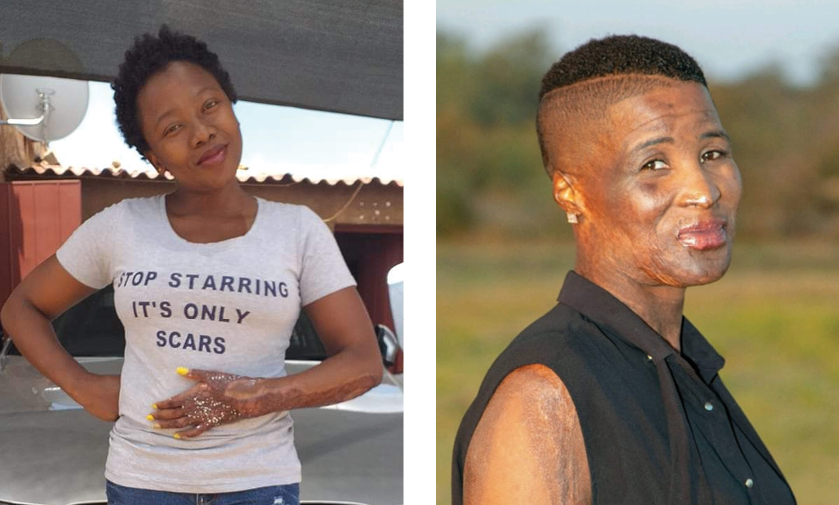 She suffered third-degree burns after a 20-litre urn of boiling water spilled on her in 2019.
She suffered third-degree burns after a 20-litre urn of boiling water spilled on her in 2019.
“While at church, we were told to steam ourselves. We were using an urn that was plugged into a socket.
“We were standing around the urn with a sack covering our heads, inhaling the steam from the hot water. In a split second, there was a spark and I just remember a sharp pain and passing out.”
Apart from being burnt by the boiling water, Mathabathe received an electric shock and passed out.
What followed was an unimaginable nightmare of pain, with months of hospitalisation, specialist appointments and psychological and physical treatment.
“The journey to healing is hard. The severe pain and trauma is close to unbearable. At times I thought I was going to die and I would ask God to spare my life as I have two children,” she says.
Mathabathe urges the public to be more supportive and sensitive when they meet burn survivors. “Treat us as normal human beings, not some kind of alien.”
Mpotseng Mokhonoana (36) agrees that the healing journey is testing.
"My accident happened in 2001. The road to healing has seen me go through the pits of hell until I became what I am now.”
She says she endured horrific teasing and bullying but says she is stronger as a result.
“I now know that I am a warrior, idol and supermom who wears her scars with pride and confidence. I tell my story repeatedly because I want to help the next person who is walking the same route as me.”
Both ladies are part of a local support group called Burn Survivors SA, which brings much-needed psychological support to its members.
According to the World Health Organisation, burns account for an estimated 180 000 deaths every year.
The National Burn Association of South Africa says being more careful around fire, flames and hot liquids will help reduce the number of accidental burn injuries that occur in the country.
For more information, contact the National Burn Association at 062 662 4862 or visit the website www.nbasa.org.za Contact Burn Survivors SA at 078 140 7336.
Vaccine registration open to the public
Vaccine registration open to the public SiboneloGovernment has officially launched the Coronavirus (COVID-19) vaccine online registration for the public – as the Department of Health gears up for phase two of the country’s vaccine rollout. 
Health Minister, Dr Zweli Mkhize, invited all citizens aged 60 years and above to register for vaccination on the Electronic Vaccination Data System (EVDS).
“This launch marks a significant milestone not only for our vaccination campaign but for South Africa’s advancement towards Universal Health Coverage,” said the Minister.
One digital system
He explained that this was the first time in democratic history that a major public health campaign will be supported by one digital system for all South Africans.
“The President, myself, hundreds of thousands of healthcare workers and now you, the citizens of South Africa, have or will access the vaccines through the same process, by using this system.”
He said there will be no distinction between private and state healthcare users, except that private healthcare users will need to share their medical aid details.
“The quality of services will be the same for all of us and the system will assign a vaccination site closest to our homes or where we work and not based on whether a particular site is a public or private facility.”
Citizens must have their ID number, medical aid number, if they have one, and ensure they put in the correct cellphone number and residential address.
Registration on the EVDS does not guarantee that you will be vaccinated immediately.
“We will use the information you provide when you register to communicate with you about the vaccination programme when necessary,” explained the Minister.
Internet connection
Minister Mkhize said teams be sent to help vulnerable citizens who do not have access to technology. Various companies have donated smartphones and fuel to assist with this process.
Help will be provided to the elderly, homeless and those who live in the deep rural areas that are difficult to reach.
“We will ensure that these team members are easy to identify and that you can verify that they are indeed accredited outreach team
members.”
They will also be trained to educate and raise awareness about vaccination in the community.
Government will announce a WhatsApp service soon to assist in this process.
“If you are unable to register by these methods, you may simply go to the nearest vaccination centre and we will register you on the spot. If you are 60 years or above, we will also vaccinate you at the same time," said the Minister.
This is because government wants to prioritise those who are most at risk of getting sick or dying of COVID-19.
He urged those who are technological savvy to assist senior citizens.
“Please help your mother, your father, your grandmother, your grandfather or your friend who is 60 years or older to register so they can get vaccinated,” said Minister Mkhize. - SAnews.gov.za
What can a parent do when their child is a bully
What can a parent do when their child is a bully Joy